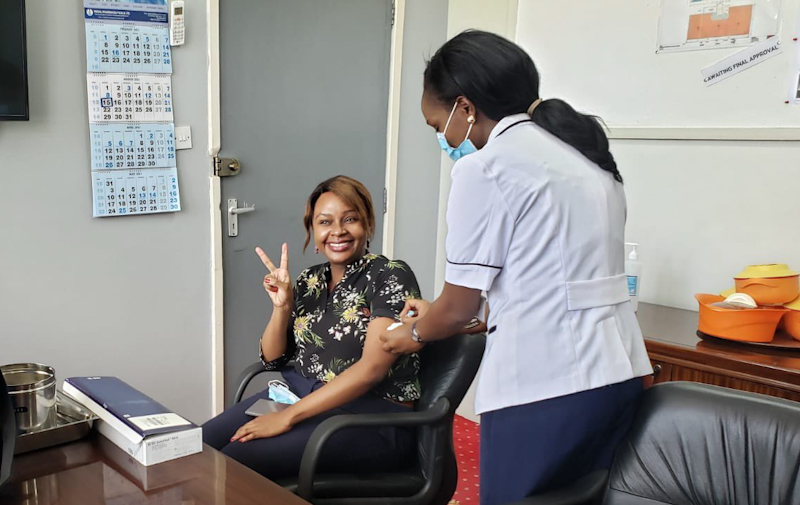Proof of COVID-19 vaccination required for Kenyans who want to shop, go for clubbing, among other essential services the ministry of health announced Wednesday.
The Chief Administrative Secretary for Health Dr Mercy Mwangangi said 3,328 people had tested positive for COVID-19 from a sample size of 11,197 pushing the positivity rate to 29.7 per cent.
“With the increase of infections following the onset of the Omicron variant, we still find that those who are vaccinated perform better against the disease. All adults in the country should be vaccinated in the shortest time possible to ensure that we have as many people as possible protected from severe disease,” said Dr Mwangangi.
COVID-19: 3,328 tests positive from a sample size of 11,197 with positivity rate of 29.7%. pic.twitter.com/WNeZnhANe9
— Ministry of Health (@MOH_Kenya) December 22, 2021
Consequently, Kenyans will be required to show proof of vaccination in public spaces.
“To access indoor services such as in supermarkets, shopping malls, clubs, restaurants, banks, you must show proof of vaccination,” Dr Mwangangi said.
“We do emphasize that we are not saying vaccination is mandatory but if you want the privilege of interacting with your community get vaccinated.”
9.2 million Kenyans have so far been vaccinated. The government has targeted 10 million.
Dr Mwangangi said that the National Emergency Response Committee (NERC) has invoked the Public Health Act to ensure that all people seeking government services are fully vaccinated.
“These measures are here to protect you and me. Right now, the Ministry of Health in putting down these directives through NERC is invoking the Public Health Act,” Mwangangi said.
“This means adults in the country should be vaccinated in the shortest time possible to ensure that we have as many people as possible protected from severe disease.”
“In the event of non-compliance, action shall be taken, which may include the withdrawal of the licence of the institution.”
67% of the population in critical care not vaccinated at all
The strict measures are being adopted amid a rise in coronavirus cases and the threat of its Omicron variant, which has become dominant ahead of Christmas and New Year gatherings.
“Today we have 15 persons in various critical care units in the entire republic. Out of these, 10 have not been vaccinated at all, that’s close to 67% of the population in critical care not vaccinated at all,” he said.
“We hope that we are going to plateau soon and not tip over the 30% mark. And for us to achieve that we have to work to ensure that we continue to comply with the non-pharmaceutical intervention and also up our game in terms of vaccination.”
“The Omicron variant is the most dominant one right now. On December 7, 76 per cent of samples were Omicron, 18 per cent Delta variant. 10 days later all samples were positive for Omicron,” Dr Patrick Amoth, President World Health Organisation Executive Board and the Acting Director-General for Health, Ministry of Health.
“It is based on that fact of high transmissibility that made it be classified as a variant of concern and that you have seen as our positivity rates fluctuating between 28% and 30%.”





1 Comment
Pingback: Kenya Approves Administration of Coronavirus Vaccine Booster Shots